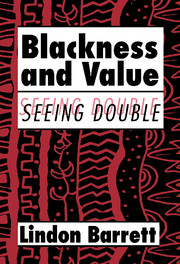Book contents
- Frontmatter
- Contents
- Acknowledgments
- Introduction: “In the Dark”
- Part One Violence and the Unsightly
- 1 Figures of Violence: Valuation, Authorization, Expenditures of the African American, and Other Ways of Telling
- 2 Figuring Others of Value: Singing Voices, Signing Voices, and African American Culture
- 3 (Further) Figures of Violence: The Street in the U. S. Landscape
- Part Two Reasonings and Reasonablenesses
- Part Three Phonic and Scopic Economies
- Notes
- Bibliography
- Index
2 - Figuring Others of Value: Singing Voices, Signing Voices, and African American Culture
Published online by Cambridge University Press: 18 December 2009
- Frontmatter
- Contents
- Acknowledgments
- Introduction: “In the Dark”
- Part One Violence and the Unsightly
- 1 Figures of Violence: Valuation, Authorization, Expenditures of the African American, and Other Ways of Telling
- 2 Figuring Others of Value: Singing Voices, Signing Voices, and African American Culture
- 3 (Further) Figures of Violence: The Street in the U. S. Landscape
- Part Two Reasonings and Reasonablenesses
- Part Three Phonic and Scopic Economies
- Notes
- Bibliography
- Index
Summary
An examination of value within the terms of its quotidian, cultural specifics remains as involved an undertaking as its theoretical anatomization, and, as one might imagine, the exercise proves even more intriguing. Particularly at issue here is the way in which the disjunctive dynamics of value as force and value as form illuminate the socialities of race, a term that the literary critic Dana D. Nelson defines provocatively as “the arbitrary enforcement and instinationalization of Anglo superiority in United States history” (21). Forgoing notions of race as an “essence” or as a primarily individual experience, Nelson's definition suggests, to my mind, just how profoundly race (the preeminent “New World” value?) and racialized practices are caught up in the agonisms of violence and form already outlined. Race, as it is made a priority in the New World, amounts to a series of actions and transactions never represented as such, but represented as formal essences instead. Nelson's pairing of “enforcement and institutionalization” captures this tension well.
Still, what exactly does it mean to pursue an understanding of race (as a value) in these terms – as both fluid and hypostasized, as concomitantly a series of transactions and the representation of a formal essence, as agonistically systemic? One might begin by highlighting the appropriateness of the term “transaction.”
- Type
- Chapter
- Information
- Blackness and ValueSeeing Double, pp. 55 - 93Publisher: Cambridge University PressPrint publication year: 1998



